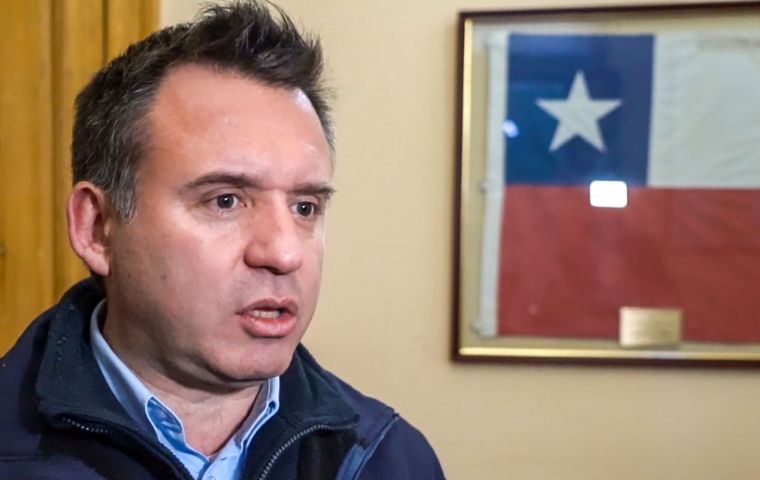MercoPress. South Atlantic News Agency
Milei's recent presence in Ushuaia triggers sovereignty concerns in Chile
 Radonich insisted Santiago needed not to just watch the ongoing events in the south from a distance
Radonich insisted Santiago needed not to just watch the ongoing events in the south from a distance Mayor Claudio Radonich of the southern Chilean city of Punta Arenas insisted this week that his country had “deantarticulated” over the past 30 years and urged the political leadership to be much more “intense” in matters concerning Antarctica given Argentine President Javier Milei's recent actions regarding the area when a United States base in Ushuaia was announced during US Southern Command Chief General Laura Richardson's visit.
While in Chile, US Deputy Assistant Secretary for Latin America Kevin Sullivan said his country was cooperating with the Argentine project to promote scientific research, logistics, and commercial navigation in the area. Regarding Argentina's feud with the United Kingdom over the Falkland/Malvinas Islands, Sullivan said that his country had a neutral position which would not change after Richardson's mission.
In a radio interview, Radonich spoke of Santiago's in the face of the Argentine government's activism on Antarctic issues. He also underlined Antarctica's strategic importance and recalled that there was a controversy still to be resolved between Chile and Argentina regarding sovereignty over the Southern Sea and Antarctica.
Radonich also recalled the official visit to Antarctica, in November 2023, by President Gabriel Boric and the United Nations Secretary-General António Guterres, which he described as an “achievement” for Chile.
“We applaud the visit of President Boric and the UN Secretary-General to the Chilean Antarctic Territory at the end of 2023, but the sovereignty and effective occupation of that space also requires strong convictions, continuous substantive and long-term investments,” Radonish also warned in a letter published by El Mercurio.
He also stressed that Punta Arenas was “the main Antarctic city in the world” with “the airport with the largest movement of passengers traveling to Antarctica each year, both tourists and scientists and military. We are the base of operations for 23 state Antarctic programs, followed by far by other so-called 'Antarctic gateways,' such as Cape Town, with 9, and Ushuaia, with four. But the marked leadership of Chile and Punta Arenas may change slowly and imperceptibly, if the elites of the State look on from Santiago, without understanding what Antarctica is for the world.”
The Mayor also called for Chile's recognition of the Antarctic territory to be included in the Constitution, which “would be a great starting point to this necessary 'new deal' of the State with the Chilean Antarctica.” Such a move “would mean, once and for all, to frame all present and future actions, both public and private, under this great objective,” he added.
“Defending the Chilean Antarctic Territory in a timely, proactive, and uncomplicated manner is a permanent duty of the State and, for this, we have to generate in parallel the necessary declarations and gestures with tangible investments of the magnitudes required to maintain and consolidate the global role and leadership of our country and Punta Arenas in the next century.”
In Santiago, Presidential Spokeswoman Camila Vallejo said that Chile's interest in Antarctica should focus on it being a “territory of peace and science.”
Vallejo also reckoned that “there are particular interests of other nations” in the area, specifically for Argentina's claim on the Falkland Islands. “We can understand, evidently, the intentions of having a presence in Ushuaia, which is Argentine territory, about moving in that direction,” she said.




Top Comments
Disclaimer & comment rulesCommenting for this story is now closed.
If you have a Facebook account, become a fan and comment on our Facebook Page!